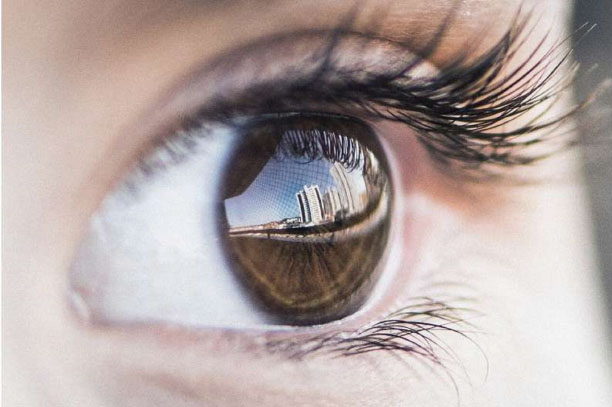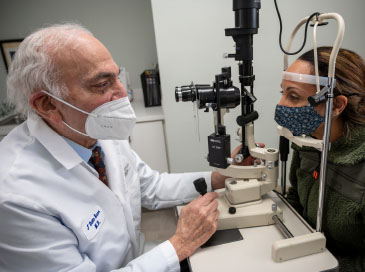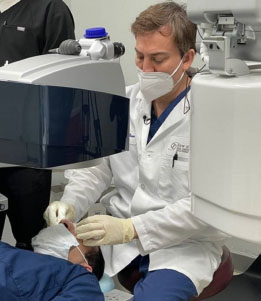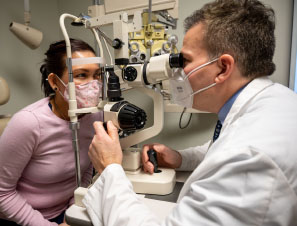Dr. Joseph Dello Russo
Shining A Light On Laser Eye Surgery

By Patricia Canole

If you’ve spent much of your life wrestling with contact lenses or wearing glasses, the appeal of corrective laser eye surgery is obvious: imagine waking up each day and seeing the world with clear vision! If you want 20/20 vision, laser eye surgery is worth looking into—but like any health procedure, there are risks and benefits.
Corrective laser surgery reshapes the cornea to achieve better vision. The cornea is the clear lens that focuses light as it enters your eye. When it is not shaped correctly or has other errors, it changes the way light lands on your retina, and in turn, the quality of your vision. Laser eye surgery reshapes the cornea to change focusing power.
You may know laser surgery under the name LASIK, which stands for laser-assisted in situ keratomileusis. It’s only one type of laser eye surgery and can usually reduce some need for corrective lenses.

If you live in the Metro New York, you know the name Dello Russo is synonymous with corrective laser surgery. Tell us how it all began?
In 1980, I purchased a research laser from a new company, VISX. The laser’s purpose was to change the front layer’s shape of the eye and eliminate glasses. That same year, the FDA selected me as an investigator to test the laser on one of my patients. The research would help the FDA decide whether it should approve that laser company for treating the public in the future. In 1996, the FDA approved the laser company, and thus the age of LASIK began. Today, Dello Russo Laser Surgery offices can be found in Manhattan, Brooklyn, Long Island, and New Jersey.
For those who wear glasses and the required facial mask during the pandemic, there has been a condition known as “foggy glasses.” Have you seen an uptick in patients wanting LASIK surgery to prevent this?
Yes. Warm breath escapes to the top of the mask, and if we wear glasses, it will cloud up the glasses. Many first responders are having this issue especially, and it has motivated them to have LASIK done. Dello Russo has seen a massive uptick in cases. And with the surgery performed, no more foggy glasses!

Explain LASIK surgery and how it affects eyesight?
If the shape of a person’s eye is not perfect, then the sight will not focus. The purpose of the laser is to reshape the cornea to an ideal shape. Originally, the procedure directly reshaped the surface but took a few days to heal properly. LASIK does not treat the surface. In fact, the surface layer is first lifted out of the way, and the cornea’s reshaping is done under this layer. This way, as soon as the layer is repositioned, the eye’s surface is smooth, and sight occurs immediately with no pain.
Who is eligible for LASIK surgery?
Not everyone is eligible, which is why an experienced surgeon must perform a thorough evaluation. Just because you wear eyeglasses or contacts doesn’t mean you are the right candidate for laser eye surgery. The most important criterion is that your vision is no longer changing. People with cataracts, extreme myopia or astigmatism, or damage to their corneas can’t benefit from laser surgery.
How does a patient prepare for surgery?
There is usually no preparation needed, so some people will elect to have surgery the same day as the consultation. We advise most people who wear contact lenses to not wear them for a few days before their visit if they decide to have LASIK after the exam.

What happens during the procedure?
Since the eye is anesthetized with numbing drops to prevent any discomfort during the surgery. The procedure is quick, usually lasting ten minutes.
Can LASIK be performed on both eyes at the same time?
Most people have both eyes done on the same day.
How long does the surgery take, and will a patient see immediately after the procedure?
The FDA decided in 1996 that LASIK was “safe and effective.”
What are the risks of LASIK surgery?
Most people have surgery to improve their distance vision. A small percentage of patients’ eyes may experience a slight natural change in the cornea’s shape. In those cases, we recommend having another surgery.
For more information on Dello Russo Laser Vision, visit dellorusso.com





